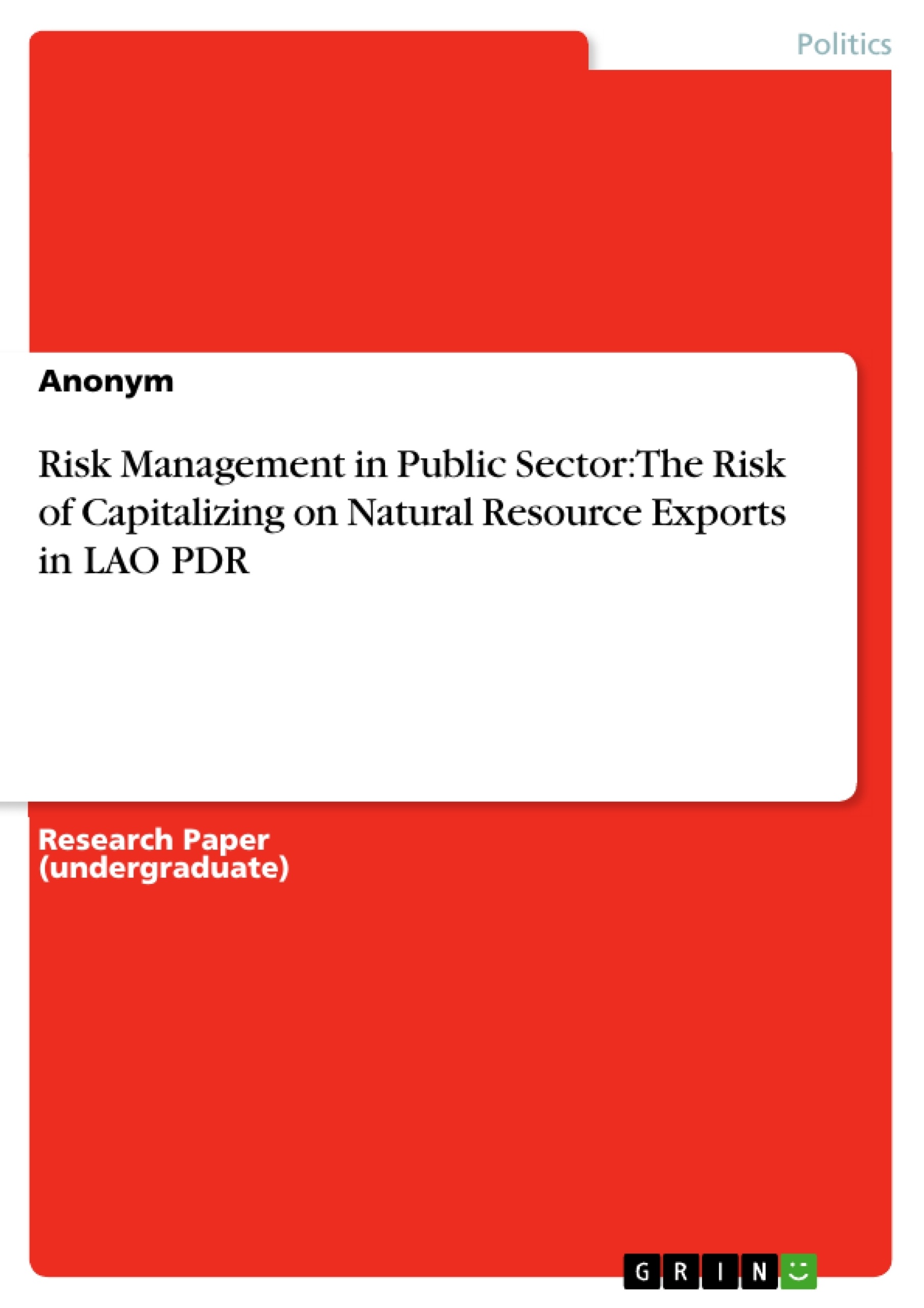The Lao People’s Democratic Republic (Lao PDR) is one of the smallest and poorest nations in Asia. However, in recent years, the country has experienced massive economic growth since their shift toward a more market-oriented economy and many trade and investment reforms. Since the 1980’s, the Lao government focused on boosting natural resource-based exports, resulting in the country's constantly strong economic growth of approximately 6,5 percent. Despite the economic growth at national levels, it can be observed that inequality and an uneven spatial development has risen. This is due to deficiencies in the public development strategy of the Lao government, which main objective is to free the country from the status of “least developed country” (LDC) as soon as possible. This particular objective is embodied within the framework of the so-called “National Growth & Poverty Eradication Strategy” (NGPES). The strategy of shifting the focus toward an export-led growth strategy is subject to many risks and uncertainties especially to the rural people of the Lao PDR, who are particularly vulnerable to external threats and who benefit at least from the country’s economic growth.
With specific focus on the Lao PDR’s natural resource exports and its adverse effects, the following paper will examine economic, environmental, and societal risks associated with the government’s regulatory growth strategy.
Inhaltsverzeichnis (Table of Contents)
- Introduction
- Problem statement and background information
- Overview & Regulatory Mapping of the NGPES
- Risk Analysis and the impact on the rural communities
- Economic Risks
- Social Risks
- Environmental Risks
- Risk Analysis and the impact on the rural communities
- Analysis of the stakeholders involved
- Recommendation and Conclusion
Zielsetzung und Themenschwerpunkte (Objectives and Key Themes)
This essay investigates the economic, environmental, and social risks associated with the Lao People's Democratic Republic (Lao PDR) government's export-led growth strategy, particularly focusing on natural resource exports. The essay examines the government's National Growth & Poverty Eradication Strategy (NGPES) and its effectiveness in reducing poverty and promoting sustainable development. The analysis highlights the potential drawbacks and challenges posed by this strategy, particularly its impact on rural communities.
- Risks associated with natural resource export-led growth in the Lao PDR
- Evaluation of the NGPES's effectiveness in poverty eradication and sustainable development
- Impact of natural resource extraction on rural communities and the environment
- Analysis of the role of stakeholders in the development process
- Recommendations for sustainable and equitable development strategies
Zusammenfassung der Kapitel (Chapter Summaries)
- Introduction: The Lao PDR's economic growth strategy is examined, focusing on the country's reliance on natural resource exports and its potential risks for rural communities.
- Problem statement and background information: The essay outlines the Lao government's shift towards a market-oriented economy, its emphasis on natural resource-based exports, and the resulting economic growth and inequality. The negative effects of the extractive industry on rural communities are discussed.
- Overview & Regulatory Mapping of the NGPES: The NGPES, aiming for sustainable poverty eradication, is analyzed. The essay discusses its policy guidelines, including a market-oriented economy, infrastructure development, and improving people's well-being. The potential risks associated with these guidelines are highlighted, such as the rise of monopolies, national debt, and environmental destruction.
Schlüsselwörter (Keywords)
The main keywords and focus topics of the text are: Lao PDR, natural resource exports, economic growth, poverty eradication, National Growth & Poverty Eradication Strategy (NGPES), environmental risks, social risks, rural communities, inequality, sustainable development, stakeholder analysis, and regulatory mapping. The text explores the challenges and risks associated with an export-led growth strategy, particularly its impact on vulnerable communities and the environment.
Frequently Asked Questions
What is the main focus of this risk management paper on Lao PDR?
The paper examines the economic, environmental, and social risks associated with the Lao government's strategy of capitalizing on natural resource exports.
What is the NGPES in the context of Lao PDR?
The NGPES stands for the "National Growth & Poverty Eradication Strategy." Its main objective is to help Lao PDR graduate from "least developed country" (LDC) status through sustainable development and poverty reduction.
What are the environmental risks mentioned in the study?
The study highlights environmental destruction caused by the extractive industries, which are central to the government's export-led growth strategy.
How does the export-led growth strategy affect rural communities?
Rural communities are often the most vulnerable to external threats and benefit the least from national economic growth, facing risks like inequality and loss of traditional livelihoods.
What economic challenges does the Lao government face?
Despite strong GDP growth (approx. 6.5%), the country faces risks such as rising national debt, the emergence of monopolies, and uneven spatial development.
What does the paper recommend for Lao PDR's development?
The paper provides recommendations for more sustainable and equitable development strategies that better include stakeholders and protect vulnerable populations.
- Quote paper
- Anonym (Author), 2021, Risk Management in Public Sector: The Risk of Capitalizing on Natural Resource Exports in LAO PDR, Munich, GRIN Verlag, https://www.grin.com/document/1245162



